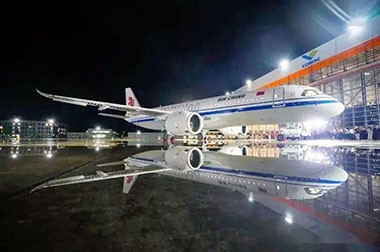7075 T7451 Aluminum
7075-T7451 is a high-strength aluminum alloy, belonging to the aluminum-zinc-magnesium-copper series of ultra-hard aluminum alloys. With its excellent comprehensive performance, it is widely used in aerospace, mold manufacturing, and other fields requiring high strength.
7075 T7451 is a high-strength aluminum alloy in the 7xxx series, known for its outstanding mechanical properties and suitability for critical aerospace and industrial applications.
The main alloying element of 7075 aluminum is zinc, with substantial additions of magnesium and copper, giving it strength comparable to certain steels while maintaining a lower density. The designation T7451 refers to a specific heat treatment that involves solution heat treatment, controlled quenching, followed by artificial aging and stress relief. This temper not only optimizes ultimate strength and yield performance but also enhances the alloy's resistance to stress corrosion cracking and improves its toughness.
7075 T7451 Aluminum Characteristics
| Characteristic | Description |
| High Strength and Toughness | 7075 T7451 aluminum alloy has exceptionally high tensile strength and yield strength, making it suitable for applications requiring extreme strength and durability. Its strength-to-weight ratio is among the best in aluminum alloys. |
| Enhanced Stress Corrosion Resistance | Compared to traditional tempers like T6 or T651, 7075 T7451 aluminum alloy exhibits significantly better resistance to stress corrosion cracking, which is critical for high-performance and safety-critical components. |
| Fatigue Performance | 7075 T7451 aluminum alloy is renowned for its excellent fatigue characteristics, capable of withstanding repeated cyclic loads without significant performance degradation, making it an ideal material for aircraft and other high-stress structures. |
| Machinability | In the T7451 temper, 7075 aluminum alloy can be machined to strict tolerances. However, its high strength may lead to rapid tool wear, necessitating controlled machining processes. |
| Weldability | Welding is generally not recommended for 7075 T7451 aluminum alloy, as welding can negatively impact its microstructure and properties, reducing mechanical performance and corrosion resistance. |
7075 T7451 Aluminum Advantages
- High Strength-to-Weight Ratio: Comparable to steel but with a lower density, making it ideal for weight-sensitive applications.
- Stress Corrosion Resistance: Superior to 2xxx series alloys (e.g., 2024) in harsh environments.
- Machinability: Good machinability in T6/T651 tempers, although precision parts may require post-processing.
7075 T7451 Aluminum Chemical Composition (Typical Range)
- Zinc (Zn): ~5.1–6.1%
- Magnesium (Mg): ~2.1–2.9%
- Copper (Cu): ~1.2–2.0%
- Silicon (Si): ~0.4%
- Iron (Fe): ~0.5%
- Other Elements: Small amounts of manganese, chromium, and titanium; the remainder is aluminum.
7075 T7451 Aluminum Applications
| Application Field | Description |
| Aerospace | 7075 T7451 Aluminum is widely used in the aerospace sector for aircraft structural components, including wing skins, fuselage parts, and landing gear components. Its high strength and low density reduce aircraft weight while maintaining structural integrity, contributing to improved fuel efficiency and flight performance. Additionally, the outstanding fatigue resistance and stress corrosion resistance of 7075 T7451 make it an ideal material to withstand complex loads and harsh environments during flight. |
| Defense and High-Performance Equipment | 7075 T7451 Aluminum is used in defense and high-performance equipment to manufacture components that must endure extremely high stress and cyclic loads. Its exceptional strength-to-weight ratio and reliability make it a preferred material for military aircraft, armored vehicles, and missile systems. In these applications, the material's stability and durability are directly linked to the safety and operational effectiveness of the equipment. |
| Other Engineering Applications | 7075 T7451 Aluminum also plays a significant role in other engineering applications, especially in the automotive and sports equipment industries. It is commonly used in the production of high-performance racing car chassis and suspension systems, motorcycle parts, and racing wheels, where components are subjected to extreme loads. Furthermore, in sports equipment such as bicycle frames, golf clubs, and mountaineering gear, the lightweight nature and high strength of 7075 T7451 ensure product durability and enhance athletic performance. |
7075 T7451 Aluminum Certifications and Standards
Products made of 7075 T7451 Aluminum typically meet industry standards such as ASTM, AMS (e.g., AMS-QQ-A-250/12), and other aerospace specifications. These certifications ensure traceability, quality, and consistency in critical applications.
7075 T7451 Aluminum Limitations
- Corrosion Resistance: The corrosion resistance of 7075 T7451 is inferior to that of alloys like 5083 Aluminum. Protective coatings are necessary in corrosive environments.
- Cost: Due to specialized manufacturing processes and alloying elements, 7075 T7451 is more expensive than standard aluminum alloys.
7075 T7451 Aluminum is the material of choice for applications demanding unparalleled strength and reliability, particularly in the aerospace sector. Its corrosion resistance drawbacks are outweighed by its exceptional mechanical properties and adaptability to custom manufacturing requirements.
7075 T7451 Aluminum represents a premium condition of the 7075 alloy series. Carefully engineered to deliver outstanding strength while enhancing stress corrosion resistance, T7451 Aluminum is crucial for aerospace and other high-performance applications. Its excellent fatigue performance, high strength-to-weight ratio, and strict compliance with aerospace standards make it a dependable choice where performance and safety are non-negotiable.




